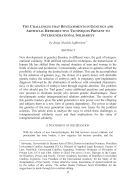Por favor, use este identificador para citar o enlazar este ítem:
https://repositorio.uca.edu.ar/handle/123456789/3154| Campo DC | Valor | Lengua/Idioma |
|---|---|---|
| dc.contributor.author | Lafferrière, Jorge Nicolás | es |
| dc.contributor.other | University of Idaho. International Academy for the Study of the Jurisprudence of the Family | es |
| dc.date.accessioned | 2019-05-23T13:16:33Z | - |
| dc.date.available | 2019-05-23T13:16:33Z | - |
| dc.date.issued | 2013 | - |
| dc.identifier.citation | Lafferrière, J. N. (2013). The challenges that developmentes in genetics and artificial reproductive techniques present to intergenerational solidarity [en línea] International Journal of the Jurisprudence of the Family 4. Disponible en: https://repositorio.uca.edu.ar/handle/123456789/3154 | es |
| dc.identifier.issn | 2165-7653 | - |
| dc.identifier.uri | https://repositorio.uca.edu.ar/handle/123456789/3154 | - |
| dc.description.abstract | Abstract: New developments in genetics threaten, in different ways, the goal of intergenerational solidarity. With artificial reproductive techniques, the transmission of human life has shifted from the mutual donation of man and woman to the fields of desire and production. Concomitantly, advances in genetics afford the possibility of selecting the desired traits of children. This can be accomplished by the selection of gametes (e.g., the choice of a sperm donor with desirable genetic traits), the selection of embryos early in pregnancy (pre-implantation diagnosis followed by the elimination of embryos with unwanted characteristics), or the selection of embryos later through eugenic abortion. The problem of who should pay for "bad genes" raises additional questions and generates new pressure to eliminate people who present genetic disadvantages. These developments render intergenerational relations ambivalent. The exercise of this genetic mastery gives the adult generation a new power over the offspring and subjects them to a new form of genetic dependency. The power to shape the genetics of the next generation raises many new issues for the juridical sciences. This article aims to analyze the ways in which these challenges to intergenerational solidarity occur and their implications for the value of intergenerational solidarity. | es |
| dc.format | application/pdf | es |
| dc.language.iso | eng | es |
| dc.publisher | William S. Hein & Co., Inc. | es |
| dc.relation | Bioderecho: Desafíos jurídicos para la persona humana planteados por la genética y las biotecnologías | es |
| dc.rights | Acceso Abierto | es |
| dc.rights.uri | https://creativecommons.org/licenses/by-nc-sa/4.0/ | es |
| dc.source | International Journal of the Jurisprudence of the Family Vol. 4, 2013 | es |
| dc.subject | REPRODUCCION ASISTIDA | es |
| dc.subject | REPRODUCCION HUMANA | es |
| dc.subject | GENETICA | es |
| dc.subject | DERECHO | es |
| dc.subject | DERECHO DE FAMILIA | es |
| dc.subject | MANIPULACION GENETICA | es |
| dc.title | The challenges that developments in genetics and artificial reproductive techniques present to intergenerational solidarity | es |
| dc.type | Artículo | es |
| uca.path | Facultad de Derecho|Artículos | es |
| uca.disciplina | DERECHO | es |
| uca.filename | /home/data-uca-generic/folder_generic/Art�culos/challenges-developments-genetics-lafferriere/metadata.xml | es |
| uca.issnrd | 1 | es |
| uca.affiliation | Fil: Lafferrière, Jorge Nicolás. Universidad Católica Argentina. Facultad de Derecho; Argentina | es |
| uca.affiliation | Fil: Lafferrière, Jorge Nicolás. Universidad de Buenos Aires; Argentina | es |
| uca.version | publishedVersion | es |
| item.languageiso639-1 | en | - |
| item.fulltext | With Fulltext | - |
| item.grantfulltext | open | - |
| crisitem.author.dept | Facultad de Derecho | - |
| crisitem.author.dept | Programa IUS | - |
| crisitem.author.dept | Centro Santa Teresa de Calcuta | - |
| crisitem.author.orcid | 0000-0003-2600-2226 | - |
| crisitem.author.parentorg | Pontificia Universidad Católica Argentina | - |
| crisitem.author.parentorg | Facultad de Derecho | - |
| crisitem.author.parentorg | Facultad de Derecho | - |
| Aparece en las colecciones: | Artículos | |
Ficheros en este ítem:
| Fichero | Descripción | Tamaño | Formato | |
|---|---|---|---|---|
| challenges-developments-genetics-lafferriere.pdf | 1,57 MB | Adobe PDF |  Visualizar/Abrir |
Visualizaciones de página(s)
93
comprobado en 30-abr-2024
Descarga(s)
69
comprobado en 30-abr-2024
Google ScholarTM
Ver en Google Scholar
Este ítem está sujeto a una Licencia Creative Commons

